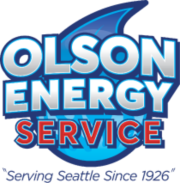-
How Often Should HVAC Be Serviced in Seattle?
Seattle’s weather, ranging from chilly winters to mild, breezy summers, makes a functioning HVAC system a necessity for year-round comfort. However, to make sure your HVAC system operates efficiently when you need it most, regular maintenance is required. But how often should HVAC systems be serviced in Seattle? Learn the importance of routine maintenance, the signs to watch for, and what you can do to keep your system running smoothly.

Why Regular HVAC Maintenance Is a Must?
Your HVAC system is a hard-working component of your home, controlling temperature, air quality, and energy efficiency. However, without regular maintenance, it can lose efficiency, increase energy bills, and even break down unexpectedly. Here are some reasons why scheduling service can help:
- Energy Efficiency: A well-maintained HVAC system runs more efficiently, using less energy and lowering utility costs.
- Extended System Lifespan: Regular maintenance helps prevent small problems from escalating, helping your system last longer.
- Improved Air Quality: Clean filters and ducts mean your system circulates cleaner air, reducing allergens and pollutants.
- Fewer Repairs: Routine checkups can identify and resolve minor issues before they turn into costly repairs.
- Safety Assurance: Faulty HVAC systems can lead to risks like short circuits or carbon monoxide buildup. Preventative maintenance keeps your home safe.
How Often Should HVAC Be Serviced in Seattle?
The general recommendation is to service your HVAC system at least twice a year:
- Once in the spring, before the cooling season starts, to prepare your air conditioning unit for summer.
- Once in the fall, before colder temperatures arrive, so your heating system is in top shape.
For Seattle homeowners, this bi-annual maintenance is particularly important due to the region’s wet and cold winters, which place higher demands on heating systems.
If your home uses specialized equipment, like heat pumps, they may require quarterly maintenance because they work year-round, both heating and cooling your home.
Signs Your HVAC Needs Immediate Servicing
Between routine checkups, you should watch for warning signs that your HVAC system may need attention. Common indicators include:
- Unusual Noises: Loud banging, whistling, or grinding sounds often point to mechanical issues.
- Weak Airflow: If certain rooms feel too warm or cold, or airflow feels restricted, it might indicate a clog or system malfunction.
- Higher Energy Bills: Unexplained spikes in energy costs often suggest your HVAC system is overworking due to inefficiency.
- Temperature Swings: If you’re constantly adjusting the thermostat, your system might not be circulating air properly.
- Foul Odors: Musty or burning smells signal potential issues with filters, wiring, or ducts.
If you notice any of these signs, don’t delay scheduling an HVAC inspection and repair services before problems worsen.
What Does a Routine HVAC Maintenance Service Include?
An HVAC service tune-up is a thorough examination and cleaning of your system to make sure everything is running efficiently. At Olson Energy Service, our certified technicians perform services such as:
- Replacing or cleaning air filters to improve airflow and air quality.
- Inspecting ductwork and cleaning for debris or dirt buildup.
- Lubricating moving parts to prevent breakdowns.
- Checking refrigerant levels for air conditioning units.
- Examining electrical connections to ensure system safety.
- Testing and calibrating the thermostat for precise temperature control.
These detailed inspections can save you time, money, and headaches while keeping your home comfortable through Seattle’s unpredictable weather.
How Long Does HVAC Maintenance Take?
On average, a routine HVAC maintenance check takes 1 to 2 hours. However, the time could vary based on:
- The system’s current condition.
- Whether a standard checkup or repairs/replacements are required.
- The size and complexity of your home’s HVAC system.
Major repairs or replacements, like a full HVAC installation, may take several days. But for typical tune-ups, you’ll be enjoying your HVAC system’s improved performance in no time.
Why Choose Olson Energy Service?
If you’re looking for a reliable HVAC team in Seattle, Olson Energy Service brings over 99 years of expertise to your home. Since 1926, we’ve proudly served the Greater Seattle Area, delivering services to keep your home comfortable year-round. Here’s what makes us stand out:
- Certified Experts: Our licensed, factory-trained technicians handle everything from maintenance to full HVAC replacements with care.
- Family-Owned and Operated: We treat your home like our own, providing a personal touch.
- Comprehensive Services: From HVAC repair and installation to electrical work, fireplace installation, and air duct cleaning, we cover all your energy needs.
- Customer-Focused: We value honesty, reliability, and clear communication on every job.
At Olson Energy Service, we go beyond basic HVAC maintenance. If you need air conditioning repair, a system replacement, or duct cleaning to improve air quality, we’ve got you covered.
Keep Your HVAC in Top Shape—Call Olson Energy Service Today!
Regular maintenance and prompt repairs keep your HVAC system reliable, efficient, comfortable and safe. Schedule your service today by calling (206) 782-5522 or filling out our online form for a free estimate. With nearly 100 years of experience, Olson Energy Service is Seattle’s go-to for professional HVAC care—keeping your home comfortable every season.
-
Seasonal Boiler Maintenance Is a Must!
Boilers are the quiet workhorses behind countless Seattle homes. They keep us warm during the city’s damp seasons and support our comfort year-round. But like any reliable system, boilers require regular attention to function at their best. Seasonal maintenance isn’t just a good idea—it’s central to your boiler’s reliable operation.
For homeowners and property managers in the Seattle area, learning why seasonal boiler maintenance should top your home care checklist can help you obtain consistent performance.
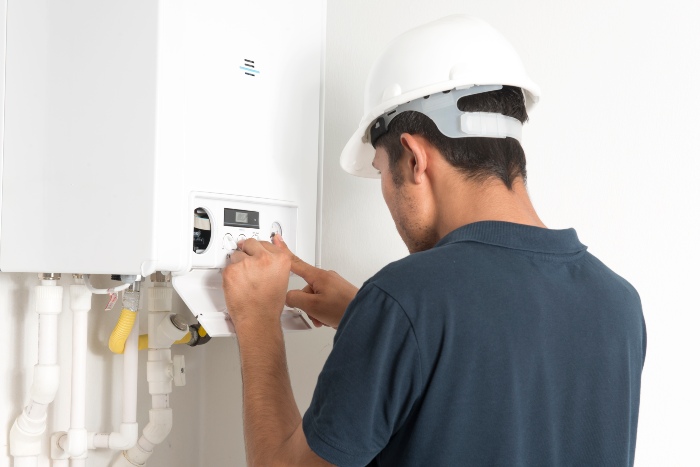
What Is Seasonal Boiler Maintenance?
Seasonal boiler maintenance involves a professional evaluation and tune-up of your heating system to check that it’s operating efficiently and safely. This process typically includes cleaning, inspections, and minor adjustments to keep your boiler functioning optimally. It’s designed to prepare your boiler for the rigors of colder weather and detect problems before they escalate into costly repairs.
Why Is Boiler Maintenance Important?
Boilers wear down over time due to continuous use, which can reduce their efficiency and even pose safety risks. Routine maintenance resolves small issues early, encourages energy efficiency, and helps you avoid unexpected breakdowns during Seattle’s chilly months.
Skipping maintenance on your boiler can lead to energy waste, unsafe operating conditions, and expensive emergency repairs, among other challenges.
The Benefits of Seasonal Boiler Maintenance
Wondering if scheduling that maintenance visit is worth it? Here are the key benefits of seasonal boiler maintenance for Seattle homes.
1. Improved Efficiency
Well-maintained boilers consume less energy to produce the same amount of heat. Cleaning and tuning up the system prevents fuel waste and helps you save on energy bills throughout the year.
2. Lower Repair Costs
Preventative care is always more affordable than emergency repairs. A maintenance visit can catch small issues—like potential leaks or unusual pressure levels—before they worsen into costly problems.
3. Longer Boiler Lifespan
A boiler that undergoes regular seasonal maintenance will last longer than a neglected one. By addressing wear and tear promptly, your system will experience less strain, maximizing its lifespan and delaying the need for a replacement.
4. Enhanced Safety
Boilers that go unchecked could create dangerous scenarios, such as carbon monoxide leaks. Annual professional inspections promote system safety.
5. Dependable Heating When It Counts Most
There’s nothing worse than your boiler breaking down when you need it most. Regular maintenance reduces the chance of heating failures during Seattle’s colder months, keeping your home cozy and warm.
The Risks of Skipping Seasonal Maintenance
Neglecting seasonal boiler maintenance may seem convenient in the short term, but the risks are significant. Here’s what can happen if you skip boiler care:
- Decreased Efficiency: Dust, debris, and worn components force your boiler to work harder, consuming more energy and raising utility bills.
- Costly Repairs: Small, undetected issues can lead to major problems, requiring expensive emergency repairs.
- Reduced Lifespan: Without maintenance, the wear and tear on your system accelerates, meaning you’ll have to replace your boiler sooner than expected.
- Safety Hazards: Unchecked boilers may result in unsafe operating conditions, such as gas leaks or carbon monoxide buildup.
Why Choose Olson Energy Service?
When it comes to boiler care in Seattle, Olson Energy Service leads the way. Since 1926, we’ve been helping homeowners and property managers maintain safe and efficient heating systems. Our factory-trained and certified technicians specialize in preventative maintenance, boiler repair, and full system replacements.
Here’s why our customers trust us for their HVAC needs:
- Nearly 100 Years of Experience in the Seattle area.
- Family-Owned & Operated, with close ties to the community.
- Exceptional Customer Service, delivering satisfaction at every step.
- Licensed, Bonded, & Insured for your peace of mind.
- Factory-Trained Technicians, dedicated to reliable and effective solutions.
- Comprehensive Services, including HVAC installation, repair, replacement, and tune-ups.
More Than Just Boiler Services
At Olson Energy Service, we don’t just stop at boiler repairs. Our offerings include a wide range of services to improve your home’s heating, cooling, and electrical systems.
- HVAC Installation & Replacement: Upgrade to efficient HVAC systems that meet your home’s needs.
- HVAC Repair Services: Get fast and reliable repairs to restore your system’s performance.
- Air Conditioning Installation & Maintenance: Stay cool during Seattle’s warmer months with expertly managed AC systems.
- Heat Pump Services: Save energy with the most cost-efficient heating and cooling option available.
- Water Heater Repair & Installation: Enjoy consistent hot water with our tankless and conventional water heater services.
From maintaining your heating to optimizing your cooling, Olson Energy Service offers holistic solutions for homeowners and property managers alike.
Act Now for a Comfortable Winter
Don’t wait until Seattle’s colder seasons arrive to care for your boiler—prevention is better (and cheaper) than emergency repairs.
Book your seasonal maintenance appointment now with Olson Energy Service. Contact us to schedule an inspection or learn more about our services.
Your comfort and safety are our priority. Trust us to provide the reliable service your home deserves.
-
Furnace Replacement vs. Repair: The Pros and Cons
Choosing Between Furnace Repair and Replacement in Seattle, WA
Your home’s furnace system can keep your home safe and comfortable throughout winter. However, if your furnace is old, outdated, inefficient, or damaged, your heating costs may rise and it may be harder and harder to keep your home at a comfortable temperature. Even with regular care and maintenance, your furnace will eventually need to be repaired. As your furnace ages and becomes less efficient, it may need more frequent repairs, and it may be more cost-effective to replace it with a newer, more efficient model. Here is your guide to choosing between furnace repair and replacement in Seattle, WA.
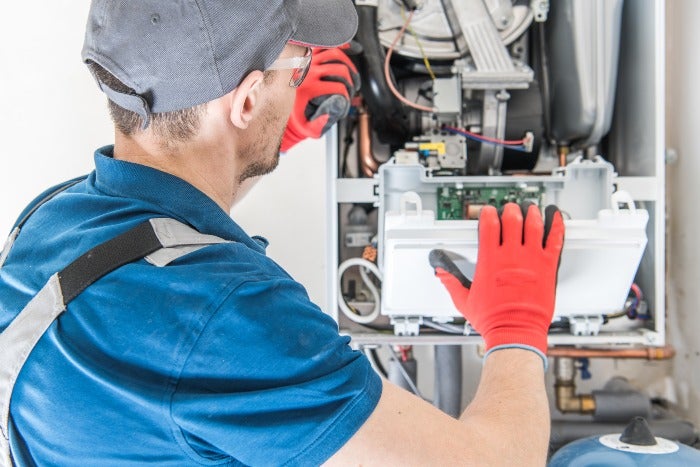
Signs You Need to Call a Furnace Repair Service
Problems with your furnace can cause discomfort and inconvenience. If you have children, elderly people, or pets in your household, furnace problems can also pose health and safety risks. It’s important to recognize the early warning signs that you should call a furnace repair service:
- There is an increase in your energy bills.
- There are multiple cold spots in your home.
- Your furnace needs to run longer to keep your home at a comfortable temperature.
- You hear strange noises from the furnace, like rattling, banging, hissing, or humming.
- You smell a burning odor or musty smell from the furnace or vents.
- You see signs of a leak around your furnace.
- The furnace short-cycles, won’t turn off, or won’t turn on.
- There is weak airflow from your vents.
- The air from your vents is lukewarm or cold.
- The pilot light on the furnace is yellow.
- You smell a gas odor or your carbon monoxide detector goes off.
- You can’t keep the pilot light lit.
- Your home is more humid than usual.
- You notice a decrease in indoor air quality.
How to Decide Between Furnace Repair and Replacement?
When you work with an experienced furnace repair company, your technician will carefully inspect your furnace. They will evaluate its age, condition, wear and tear, safety, performance, and efficiency. They can determine if it would be safer and more cost-effective to repair or replace your furnace. Here are some of the factors they will consider before recommending furnace repair or replacement:
- Your furnace is over 10 years old.
- Your furnace was not installed properly.
- You don’t have the right size furnace for your house or household needs.
- Your furnace is inefficient or unsafe.
- You have paid for multiple furnace repairs over the last few years.
- It is hard or impossible to find replacement parts for your furnace.
- An expensive part needs to be replaced.
- You haven’t kept up with furnace maintenance.
Benefits of Home Furnace Replacement
Replacing your furnace allows you to purchase a newer, more energy-efficient model. An energy-efficient furnace can save you money on your energy bills, keep your home at a more consistent temperature throughout the winter, and allow you to take advantage of government incentives like tax credits and rebates. The biggest benefits of home furnace replacement are:
- Improved energy efficiency
- Reduced energy bills
- Less frequent need for furnace maintenance
- Lower risk of furnace repairs or outages
- More consistent heating and improved comfort
- Improved indoor air quality
- Reduced risk of gas or carbon monoxide leaks
- Increase home value
- Ability to integrate smart home technology
- Right size furnace for your household’s needs
Cost Comparison Between Repairing and Replacing Your Furnace
The cost of a new furnace vs. the cost of repairing your furnace will depend on many factors. An older furnace may cost more to repair and may require more extensive repairs. It may also be harder to find replacement parts for an older furnace. Repairing a furnace that is over 10 years old may end up being more expensive than installing a new furnace. New furnaces are also more energy-efficient, which means they offer long-term cost savings. Energy-efficient furnaces can reduce your need for furnace maintenance and repair, which can save you money. They can also increase the resale value of your home.
Energy Efficiency Considerations When Choosing a New Furnace
Choosing an energy-efficient furnace will improve the safety and comfort of your home and save you money on your energy bills. Here are some tips for choosing an energy-efficient furnace:
- Check the furnace’s annual fuel utilization efficiency (AFUE) and only choose a high rating. The most energy-efficient furnaces have an AFUE rating of 98.5%.
- Look for a furnace with an ENERGY STAR label. ENERGY STAR is an independent testing organization that evaluates the efficiency of appliances. ENERGY STAR appliances are highly efficient.
- Choose the right size furnace for your household. Buying a furnace that is too large will result in energy waste.
- Choose a clean, eco-friendly, and efficient fuel type.
- Install a furnace with a variable-speed blower to adjust your heating output to your climate and needs and improve efficiency.
- Buy a furnace from a reputable brand known for its quality and durability.
- Hire a professional for furnace installation.
- Schedule regular furnace maintenance and furnace inspections to extend the lifespan of your furnace, reduce the need for repairs, and maintain the furnace’s efficiency.
- Know how often to replace furnace filters to improve performance, efficiency, and indoor air quality.
Schedule a Furnace Inspection with Olson Energy Service
At Olson Energy Service, our experienced technicians specialize in residential and commercial AC and furnace replacement services and repairs. We can complete a thorough inspection and evaluation of your furnace to determine if it needs repairs, replacement parts, or maintenance. We can also provide our professional recommendation for furnace repairs or replacement. Call or contact us online to request an estimate or schedule a consultation for furnace repair services or home furnace replacement in Seattle, WA.
-
How Do Electrical Services Benefit My Home?
Benefits of Residential Electrical Services in Seattle, WA
Your electrical system is the heart of your home. It must run smoothly and safely to provide the necessary power to crucial appliances, electronics, and devices that maintain your comfort, security, and convenience. When you have a problem with your home’s electrical system, you may be at risk of health and safety issues ranging from electrical fires and electric shocks to power outages and power surges. You can maintain the safety and comfort of your home by scheduling regular electrical safety inspections and only trusting professional electrical for electrical services like repairs, installations, and upgrades. Here is a look at the benefits of residential electrical services in Seattle, WA.
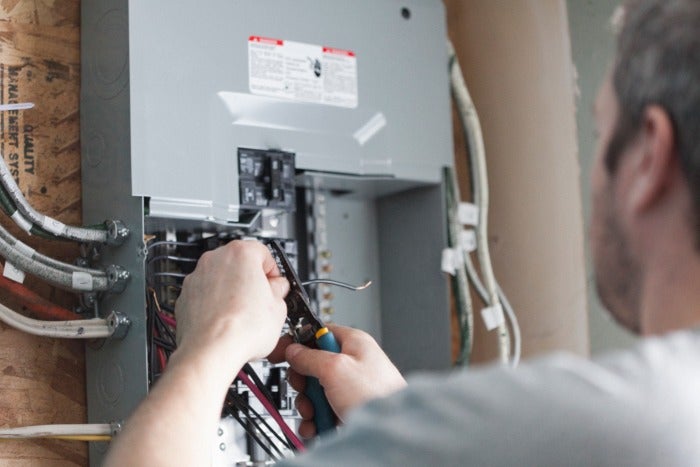
What Are Residential Electrical Services?
Residential electrical services are any electrical services provided to your home. They ensure your home’s electrical system is in safe operating condition and is running smoothly and efficiently. Residential electricians or electrical contractors can assess the age, performance, safety, condition, and efficiency of your home’s electrical system and provide recommendations for electrical repairs, maintenance, and upgrades or replacements.
What’s Included in Routine Home Electrical Services?
Routine home electrical services include electrical inspections, maintenance, diagnosis of electrical problems, electrical repairs, and electrical installation services and replacements. Most residential electricians offer the following types of home electrical services:
- Electrical safety inspections
- Electrical troubleshooting
- Electrical repair services
- Electrical outlet installation and replacement
- Electrical code violation services
- Electrical upgrades and replacements
- Emergency electrical services
- Electrical maintenance
- Electrical installation services
- Electrical code compliance services
- Circuit breaker and electrical panel services
- Dedicated electrical circuit installation
- Light fixture and switch repair
- Post-outage repair and restoration services
- Faulty wiring and outlet repair and replacement
When Do You Need Emergency Electrical Services?
Emergency electrical services are services provided in the event of a serious electrical problem, after damage to your electrical system, or during or after a power outage or natural disaster. It’s important to recognize the warning signs of an electrical emergency so you can call an electrician right away. Waiting to call may result in damage to your home or threats to your health, safety, and comfort. Here are some of the signs you need emergency electrical services:
- Smell of burning plastic or metal or a fishy odor coming from outlets, appliances, electronic equipment, or your electrical panel
- Smoke or fire when using an electrical appliance or coming from outlets, switches, or cords
- Sparks from an outlet, when plugging in or unplugging an appliance, or when using an appliance
- Sudden power outage
- Tripped breakers that you can’t reset
- Flickering or dimming lights
- Warm or hot outlets
- Burn or scorch marks on switches or outlets
- Melted plugs, electrical cords, outlets, or switches
- Frayed or damaged electrical wiring
- A buzzing sound from your walls or electrical appliances
Why Hire a Professional for Electrical Installation Services?
Trying to DIY electrical services can result in injury, property damage, and electrical code violations. Your home’s electrical system is very complex, and one wrong move could result in an electric shock, electrocution, electrical fire, property damage, or serious injury or death. Electrical services require specialized knowledge and the use of specialized tools and equipment. Electricians have the education, training, experience, and tools necessary to complete safe electrical repairs. You should only trust a professional, experienced electrician or electrical contractor to provide electrical services. An electrician will make sure your home is safe and that all electrical components are functioning as they should be. They will also ensure electrical repairs are done correctly, safely, and per the National Electric Code.
Benefits of Electrical Services
Scheduling regular electrical services from an experienced electrician will keep your home safe, efficient, and comfortable. The biggest benefits of professional residential electrical services are:
- Electrical Safety Inspections – An electrician can inspect and evaluate each component of your electrical system to make sure it is in good condition and operating safely and properly.
- Energy Efficiency Upgrades – Upgrading your electrical appliances or electrical system can improve the energy efficiency of your home. You may see a decrease in your energy bills, and you may be able to take advantage of government incentives like rebates and tax credits.
- Cost Savings – Maintaining your home’s electrical system will reduce your risk of electrical outages, electrical emergencies, and the need for electrical repairs. You can save time and money by staying up to date on routine electrical services and maintenance.
- Increased Home Value – Hiring a professional for electrical services will maintain the value and comfort of your home. Making energy-efficient electrical upgrades can increase the value of your home and make it easier to sell in the future.
- Smart Home Integration – A residential electrician can help you integrate smart home technology into your home. This can improve convenience, comfort, safety, and accessibility for your whole family.
Request an Estimate for Home Electrical Services
Olson Energy Service is a local, family-owned and operated electrical services provider. We are committed to electrical safety, quality workmanship, cost-effective electrical solutions, and exceptional customer service. We specialize in residential and commercial electrical services, including electrical safety inspections, compliance and code violation services, electrical efficiency upgrades, electrical maintenance and repair, electrical installations, emergency electrical services, and more. Call or contact us online to request an estimate or schedule a consultation for home electrical services in Seattle, WA.
-
Is Now the Time for a New Water Heater?
Introduction to Water Heater Choices in Seattle, WA
At Olson Energy Service, we pride ourselves on being Seattle’s trusted water heater experts. Living in Seattle, WA, means experiencing a mix of rainy, chilly, and sometimes unpredictable weather. This makes having a dependable water heater not just a luxury, but a necessity. Whether you’re in the early stages of considering a new water heater installation or are on the fence about replacing an old unit, our team is here to provide insights, expertise, and guidance.
Selecting the Right Water Heater for Seattle Homes
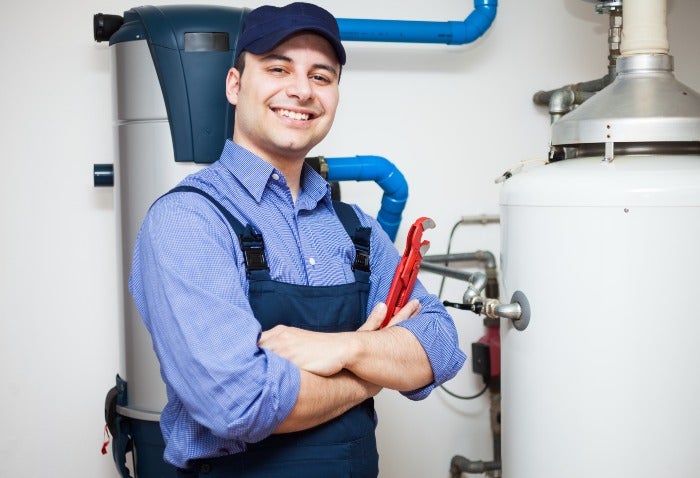
Choosing the ideal water heater for your home involves more than just picking a model. It’s about understanding your home’s unique requirements and ensuring you make an informed decision:
- Your Home’s Size and Needs – Different homes have varying hot water demands. Selecting a unit that can comfortably serve your entire household without straining is essential.
- Energy Efficiency – Modern water heaters are designed with energy conservation in mind. An energy-efficient model can significantly reduce your utility bills.
- Type of Water Heater – The market offers a range of water heaters, from traditional tank models to innovative tankless water heaters. Each type has its benefits and potential drawbacks.
Signs It’s Time to Replace Your Water Heater
Routine maintenance can extend your water heater’s life, but it won’t last forever like all appliances. Here are clear indicators that it might be time for a new unit:
- Frequent Leaks – Persistent leaks can signal internal issues or wear and tear.
- Age – If your water heater is approaching or has surpassed the 10–12-year mark, it’s time to consider a replacement.
- Consistent Breakdowns – If you’re calling for repairs more often than not, a new unit might be more cost-effective in the long run.
Average Lifespan of Water Heaters
Different water heaters have varying lifespans, largely influenced by their design and how they’re maintained:
- Conventional Tank Water Heaters – These units have an average lifespan of about 11 years. However, with regular maintenance, some can serve you for up to 15 years.
- Tankless Water Heaters – Known for their longevity, these can last up to 25 years when properly cared for. Their on-demand heating mechanism reduces wear and tear, contributing to their extended lifespan.
Installation Time for New Water Heaters
Installing a new water heater is a task best left to professionals. With Olson Energy Service, you can expect:
- Quick and Efficient Installation – Our team is trained to install water heaters efficiently, ensuring you’re not without hot water for long.
- Professional Guidance – We believe in keeping our clients informed. We’ll explain the installation process, answer any questions, and provide tips for maximizing your water heater’s performance.
Post-Installation Care for Your Water Heater
To ensure your water heater serves you well for years, post-installation care is crucial:
- Schedule Regular Maintenance – Like any other appliance, your water heater benefits from regular check-ups. This prolongs its life and ensures it operates at peak efficiency.
- Monitor for Any Issues – Be proactive. If you notice any irregularities, such as fluctuating water temperatures or unusual noises, it’s best to consult a professional.
- Consult Professionals for Repairs – DIY repairs can be tempting, but for the longevity of your unit and safety, always rely on expert water heater repair services.
Why Trust Olson Energy Service?
Olson Energy Service is your go-to solution if you’re in Seattle, WA, and have any water heater concerns. Whether it’s a new installation, a repair, or just some advice, our team is eager to assist. Reach out today and experience unparalleled service. Choosing Olson Energy Service means opting for quality, reliability, and expertise because of our:
- Decades of Experience – With years of serving the Seattle community, we’ve built a reputation for excellence.
- Expert Team – Our technicians undergo rigorous training to ensure they’re equipped to handle all water heater challenges.
- Commitment to Quality – It’s not just about fixing or installing water heaters; it’s about ensuring our clients are satisfied and their homes are comfortable.
-
Stopping Heat Loss in Your Home
If you’re like most Seattle homeowners, you want to prevent heat loss in your home—not only because it will make your home chilly, but also because you’ll end up spending more money to keep your household comfortable. Even when you turn up the thermostat, however, your home heating system may not be keeping you warm. Have you noticed that some parts of your home stay colder than others? As this video explains, the most likely culprit is inadequate insulation and poorly sealed windows and doors. When cold air seeps in from the outside, you can run the furnace for hours without being able to effectively warm some of the rooms in your house. To learn more about how to stop heat from escaping your home, watch the full clip.
-
What Homeowners Need to Know About Geothermal Heat Pumps
If you’re looking to keep your energy costs down in your household this year, you may want to think about installing a heat pump . Obtaining a home energy audit from an HVAC contractor in Seattle can help you determine whether this is a worthwhile investment for you. Geothermal heat pumps are a popular option for cold climates. If you’re interested in learning how these devices work, keep reading.
What are geothermal heat pumps?
A heat pump is a heating system that works by transferring heat out of one space and into another—for example, from the air outside your home to the air inside. Geothermal heat pumps work by transferring heat to or from an area a few feet under the ground, which stays at a steady temperature throughout the year. As with other heat pumps, these systems can be used to either heat or cool the air inside your home, and they can also be used to heat water.
What are the different types of geothermal heat pumps?
There are two distinct types of geothermal heat pumps used in homes: Closed loop and open loop systems. Open loop systems rely on groundwater to exchange heat, while closed loop systems can use either vertical or horizontal installations or rely on a nearby lake or pond for heat exchanges. When you talk to a contractor about installing your heat pump, he or she will inspect your property and advise you which option is best suited to your needs.
What are the advantages of geothermal heat pumps?
Since the temperature of the ground doesn’t change from one season to the next, geothermal heat pumps are much more efficient than heat pumps that rely on air. They are highly eco-friendly, since they don’t produce any emissions or have any noticeable impact on the environment. Geothermal heat pumps also require little maintenance once they’ve been installed, and they are quiet and unobtrusive.
““
-
Strategies for Improving Your Indoor Air Quality
Most people spend most of their time indoors, which means that the air they’re most exposed to is the air inside their homes. That means that the quality of your indoor air can have a significant impact on your life. Acting to improve your indoor air quality can make your Seattle home a safer and healthier place for you and your family. Here are some of the steps you can take to make your household air cleaner:
Invest in an Air Cleaner
Air cleaners—or air purifiers—are devices that are designed to remove contaminants such as dust and pollen from the air. If you can’t seem to keep allergens out of your home, an air cleaner may be a smart investment for you. It’s important to keep in mind, however, that air cleaners work best if you are already using other ways to minimize the number of pollutants in your household air.
Have Your Ducts Cleaned
If you don’t have them cleaned out from time to time, your HVAC system’s air ducts can harbor dust, pollen, mold, pet dander, dust mites, and other contaminants. When you run your furnace or air conditioner, these pollutants are spread throughout your entire home. If you suffer from allergies, this can make them worse. Having your ducts cleaned by a professional can help to ensure that your indoor air stays clean and breathable.
Call for Regular HVAC Service
When you use your furnace or air conditioner frequently, the various components of your HVAC system can get dirty and moldy—which will not only impact your air quality, but can also cause your system to break down. To reduce your need for repairs and maintain high-quality air inside your home, you should have your system inspected, cleaned, and serviced by an HVAC professional on a regular basis.
-
3 Simple Ways to Make Your HVAC More Energy-Efficient
Have you ever stopped to wonder just how much energy you use heating and cooling your Seattle home every month? In fact, according to the U.S. Department of Energy , nearly half of all of the energy you pay for in your household goes toward running your heating, ventilation, and air conditioning . This means that making your heating and cooling systems run more efficiently can help you both reduce your household’s environmental impact and keep your energy expenses down. Here are some simple steps you can take for a more energy-efficient HVAC system:
Buy a programmable thermostat.
Purchasing and installing a programmable thermostat is a great way to rein in your energy usage at home. Programmable thermostats let you schedule different settings throughout the day, ensuring that you aren’t needlessly running your HVAC system late at night, or when nobody is home. The latest programmable thermostats even allow you to adjust them remotely using Wi-Fi.
Change out your air filter.
When your air filter gets clogged up with a lot of dirt and debris, it means that your HVAC system won’t be running as efficiently. Fortunately, you can forestall that problem by making sure to change out your old air filter for a new one once every month or so. The more heavily you’re relying on your air conditioning or furnace, the more frequently you will want to change your filter.
Upgrade your entire HVAC system.
The older your air conditioner or furnace is, the more inefficient it is likely to be. As time goes on, this can turn into an expensive problem. One of the best ways to reduce your energy usage is to replace your old HVAC system with a newer, more energy-efficient one. Make sure that any new HVAC equipment you buy has been certified by Energy Star, which signifies that they are among the most energy-efficient products available.
-
Ductless Heat Pumps 101
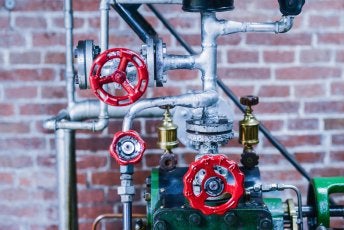
Ductless systems are fast becoming one of the most popular methods of heating and cooling modern homes, and it’s not hard to see why. Compared to traditional central HVAC systems, ductless heating and cooling systems are versatile, efficient, and cost-effective. If you’re considering adding a ductless heat pump to your Seattle home, here’s what you should know.
Ductless systems are effective heaters.
A ductless heat pump works by using a system not unlike the one that powers your refrigerator. The pump uses a compressor to transfer heat from outside into your living space, where the degree of heat you get can be controlled using a remote control. It’s a simple process that results in reliable, consistent heating. Ductless heat pumps are extremely quiet to operate, and they are also much less expensive to use than furnaces.
Ductless systems are highly efficient.
If you’re looking to cut back on your energy usage, a ductless system is a great option for home heating. With a ductless heat pump, you can heat every space by only as much as it needs and avoid unnecessary energy use. HVAC systems with ducts also tend to lose a lot of heat during the process of distributing it throughout your home, which isn’t an issue with a ductless system.
Ductless systems can be used anywhere.
One of the chief advantages of ductless heat pumps is their sheer versatility—they can be used to heat virtually any type of home space, whatever its size. Unlike other heating systems, they don’t require you to install any pipes or other room additions. If you’re ready to retire your outdated, inefficient central heating system, a ductless heat pump is a terrific option. You can also use ductless heat pumps to complement your existing system if you have a space that you’re having trouble heating.
RECENT POSTS
categories
- Uncategorized
- Air Conditioner
- Fireplace Inserts
- Fireplace Insert Installation
- Air Conditioning Installations
- Air Conditioning Units
- Air Conditioner Maintenance
- HVAC Professionals
- Heat Pump Installation
- Heating and Cooling
- HVAC Unit
- Heat Pumps
- Furnace
- Furnace Service
- Tankless Water Heaters
- Water Heaters
- Energy Efficiency
- HVAC Contractors
- Olson Energy Service
- Mini-Split Systems
- Ductless Air Conditioner
- Residential Services
- Seasonal Boiler Maintenance
- HVAC Maintainance
